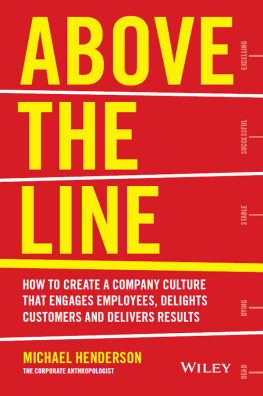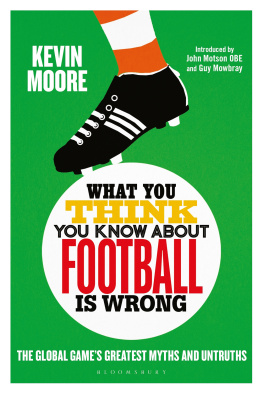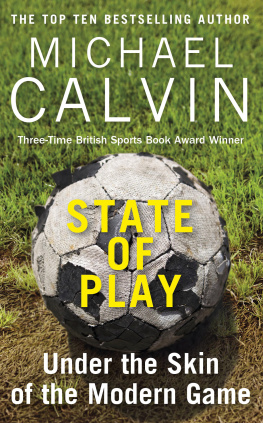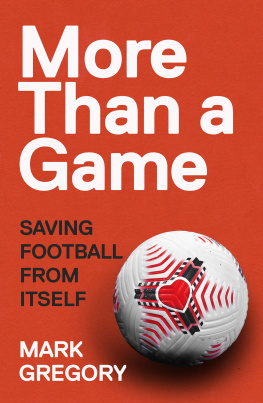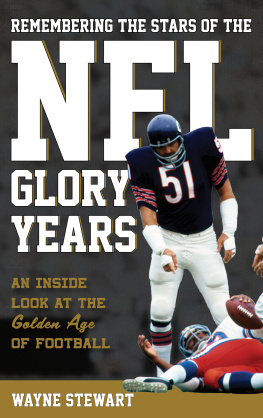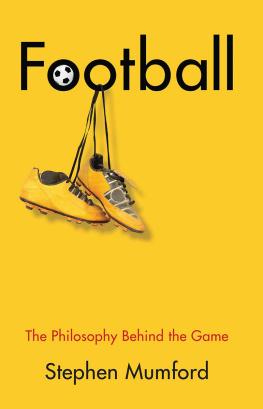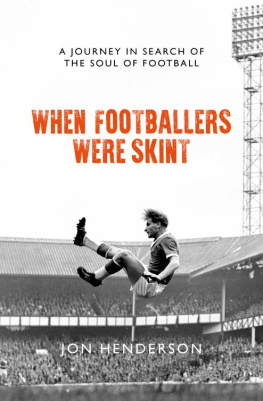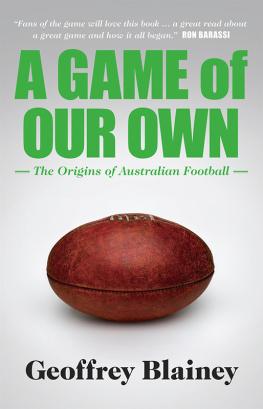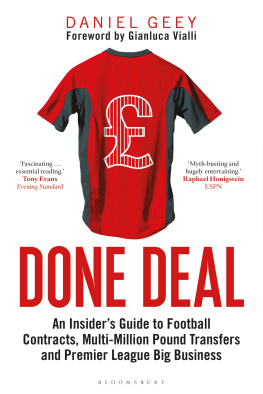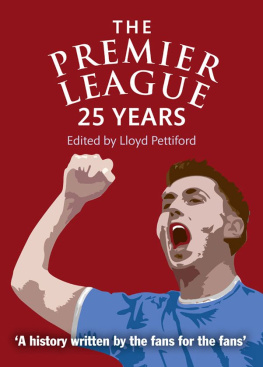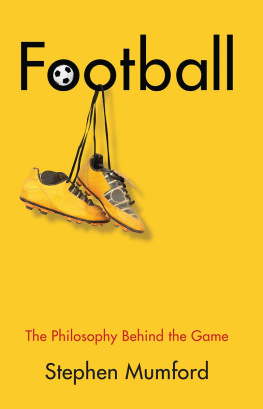50 PEOPLE WHO
FOULED UP FOOTBALL
50 PEOPLE
WHO FOULED
UP FOOTBALL
MICHAEL HENDERSON
Illustrations by
NICOLA JENNINGS
Constable London
Constable and Robinson
3 The Lanchesters
162 Fulham Palace Road
London W6 9ER
www.constablerobinson.com
Published in the UK by Constable,
an imprint of Constable & Robinson Ltd 2009
Text copyright Michael Henderson 2009
The right of Michael Henderson to be identified as the author of this work has been asserted by him in accordance with Copyright, Designs and Patents Act, 1988.
Illustrations Nicola Jennings
All rights reserved. This book is sold subject to the condition that it shall not, by way of trade or otherwise, be lent, re-sold, hired out or otherwise circulated in any form of binding or cover other than that in which it is published and without a similar condition including this condition being imposed on the subsequent purchaser.
A copy of the British Library cataloguing in Publication Data is
available from the British Library.
ISBN 978-1-84901-152-5
Printed and bound in the EU
1 3 5 7 9 10 8 6 4 2
In memory of my father, Rev. James Henderson,
who loved football
Contents
Acknowledgements
The thoughts in this book are mine but they arose from years of lively conversations with friends, usually in places where strong drink is taken. I must therefore thank Philippe Auclair, Patrick Barclay, Conor Brennan, Howard Davies, Mike Dickson, Mike Ellison, Neil Hallam, Daniel Harding, Robert Madge, Gerald Mortimer, Michael Parkinson, Giles Phillips, Nick Rowe, Colin Shindler, Clive Toye, Chris Travers and Bob Willis. For one specific suggestion I am indebted to Adrian Deevoy. Thanks also to Andreas Campomar, and to those Blest Pair of Sirens, Ludwig and Franz, who are always there.
Introduction
M ost people born in Lancashire enjoy their football, and I am no exception. For much of my early life I probably took more of an interest than is healthy. At the age of five I was taken to Burnden Park, where Bolton Wanderers ended up when they stopped trotting, and for the next twenty years I was committed to the game in a way that, glimpsed from the sunlit uplands of encroaching middle age, seems rather quaint.
Did I really drive the length and breadth of the land to watch matches involving teams with whom I had no emotional connection? Indeed I did; nor was I alone. Football used to be like that. In the golden age of English football the appearance of Tom Finney or Stanley Matthews could put 20,000 on the gate. In 1969, when Roger Hunt joined Bolton from Liverpool, 5,000 well-wishers tootled along the East Lancs Road to watch his debut.
Burnden was home to the Trotters until 1997, when they moved to the Reebok Stadium, which is closer to Chorley than Bolton. Lowry depicted the ground in Going to the Match, so it survives on canvas, as it does in the imagination of all who knew it in the good old, bad old days. It was a decrepit place, as were so many of those grounds, yet it conveyed a flavour of English football, with its wintry fug of brown ale, meat pies and Woodbines, more authentically than the clean lines of stadiums like the Reebok.
Going to the match! We would get there in good time, my father and I, buying a programme on the way in a most important ritual and Dad would be familiar with every player on both sides before kickoff. Week by week I digested everything he told me. Hull play in amber, not gold. Wolves play in gold. A great club, Wolves. Billy Wright played for them. Captain of England. But the most famous club is Arsenal. Bolton never beat them. This was quite true. Arsenal came to Burnden in 1967, for a fourth-round FA Cup tie, and our hopes were high, but Bolton did not beat them.
Then the players would run out, solid men with proper names: Eddie Hopkinson, the goalie who had played for England, Syd Farrimond, John Hulme, Dave Lennard, John Byrom. The manager was Bill Ridding, promoted faute de mieux from the physiotherapists room. Its easy to laugh at the way things used to be done, but funnier things have happened in our supposedly more progressive times. In 2008, facing a desperate fight against relegation, Newcastle United appointed Joe Kinnear.
Those years heard the last melancholy roar of the old order. Other than the Trotters, who won the FA Cup in 1958, Blackburn Rovers, Burnley and Preston North End all reached Wembley in the years between Suez and the white heat of Harold Wilsons first government. Lancashire was the natural home of English football. To one mind it still is. Though I spend more time in Berlin and Vienna these days than the county of my birth I am an unrepentant Red Rose nationalist where football is concerned. Like dubbined boots, players lining up in numbers 1 to 11, and matches kicking off at three oclock on Saturday afternoon (and ending no later than 4.42), it is part of my personal mythology.
We are all prisoners of the past, and my love of football was forged on that oldfashioned ground. I may not have seen Nat Lofthouse, the great centre forward ennobled as the Lion of Vienna, but there were plenty of tales to stimulate my curiosity. My maternal grandfather had attended the White Horse Cup Final of 1923, when the Wanderers beat West Ham United 20, and my mother was at Wembley for the so-called Matthews Final thirty years later, when Blackpool came from behind to win 43, though she never cared for that sobriquet. It was Ernie Taylor who won it, she used to say, not Matthews at all. Actually, it was Stan Mortensen, who scored three goals that day: the hat-trick that nobody remembers!
In between those famous finals my parents had stood, separately, in a crowd of 84,000 (allegedly) at Burnden in March 1946 when thirty-three spectators were crushed to death during the match against Stoke City. Donny Davies, the celebrated football writer known to readers of the Manchester Guardian as Old International, who was to perish in English footballs next tragedy, the Munich air crash of February 1958, was a friend of the family.
I mention these things to supply a context. If I now dislike so much about football, and what it has come to represent in our flattened national culture, it is painful, for the game gave me so much. Like thousands of others brought up in towns where Association Football played a full part in the life of what could still be called a community, I absorbed it naturally. There was no patronising talk of the game being part of popular culture. That was implicit in our daily experience.
Francis Lee, the barrel-chested No. 7, was my hero, so when he left Bolton for Manchester City in October 1967 I followed him to Maine Road. Within seven months City were champions, with Lee their standard-bearer. Nine years later, at school by the staid and silver Trent, I observed the last knockings of his career at Derby County. I sent him one of only two fan letters I have ever written, and received a generous reply. When we eventually met, in 2003, I learned it had come from his hand.
It was a lovely letter.
Course it was. I wrote it myself.
I thought secretaries did that kind of thing.
Dont talk daft.
The other fan letter, incidentally, went to Bryan Ferry, who also replied in person: I have a new single coming out next month, called The In Crowd. I hope you will like it. Not every young boy is so lucky with his heroes.
At twelve, having passed the Common Entrance exam, my father gave me a copy of Arthur Hopcrafts book, The Football Man, which should require no amplification for anybody who loves the game. That path led to journalists such as Eric Todd, Hugh McIlvanney and David Lacey. But one man stood out. No England fixture was over until Brian Glanville had pronounced on it in the


